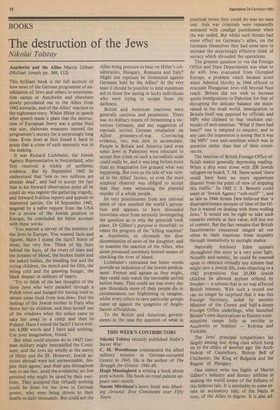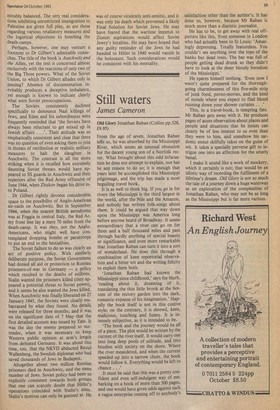The destruction of the Jews
Nikolai Tolstoy
Auschwitz and the Allies Martin Gilbert (Michael Joseph pp. 368, £12) This brilliant book is the full account of how news of the German programme of annihilation of Jews and others in extermination camps at Auschwitz and elsewhere slowly percolated out to the Allies from 1942 onwards, and of the Allies' reaction to the nightmare story. Whilst Hitler in speech after speech made it plain that the destruction of European Jewry was a prime Nazi war aim, elaborate measures insured the programme's secrecy for a surprisingly long time. Even Jews at first found it hard to grasp that a crime of such enormity was in the making.
It was Richard Lichtheim, the Jewish Agency Representative in Switzerland, who first received a trickle of authentic evidence. But by September 1942 he understood that 'one or two millions are already dead', and had to accept the fact that in his forward observation point all he could do was register the gathering tragedy, and forward fruitless reports and appeals to interested parties. On 18 September 1942, angered by a naive request from the USA for a review of the Jewish position in Europe, he concluded his bitter account with these words: 'You wanted a survey of the position of the Jews in Europe. You wanted facts and figures. Have I stated the facts? Some of them, but very few. Think of the facts behind the facts, of the rivers of tears and the streams of blood, the broken limbs and the naked bodies, the bleeding feet and the crying children, the stench and the filth, the biting cold and the gnawing hunger, the black despair in millions of hearts.
'Try to think of the last thoughts of the three Jews who were paraded through a Polish town and hanged for having tried to obtain some food from non-Jews. Feel the feelings of the Jewish mother in Paris who threw her six children, and then herself out of the windows when the police came to take her away to a camp and then to, Poland. Have I stated the facts? I have written 4,000 words and I have said nothing. Use your imagination, friend.'
But what could anyone do in 1942? German military might bestraddled the Continent, and the Jews lay wholly at the mercy of Hitler and the SS. However, Jewish activists abroad were not unreasonable, despite their agony, and their aim throughout was to see that, amid the avalanche, no Jew perished who might be saved by their exertions. They accepted that virtually nothing could be done for the Jews in German power, who were being driven to their deaths in daily thousands. But could not the Allies bring pressure to bear on Hitler's collaborators, Hungary, Romania and Italy? Might not reprisals be threatened against Germans held by the Allies? At the very least it should be possible to lend maximum aid to those few daring or lucky individuals who were trying to escape from the darkness.
British and American reactions were generally cautious and pessimistic. There was no military means of threatening a victorious Germany, and any suggestion of reprisals invited German retaliation on Allied prisoners-of-war. Convincing evidence, too, was slow to accumulate. People in Britain and America (and even some Jews in Palestine) were reluctant to accept that crime on such a surrealistic scale could really be, and it was long before more than an imaginative few grasped what was happening. But even as the tide of war turned in the Allies' favour, so even the most sceptical observer was obliged to accept that they were witnessing the planned murder of a whole people.
Its very pointlessness from any rational point of view numbed the world's perception and appears to have dissuaded historians since from seriously investigating the question as to why the genocide took place. Dr Gilbert's purpose is threefold: to relate the progress of the 'killing machine' at Auschwitz; to chronicle the slow dissemination of news of the slaughter; and to examine the reaction of the Allies, who alone possessed extremely limited means of checking the river of blood.
Lichtheim's restrained but bitter words provide an indication of the Jewish predicament. Protest and agitate as they might, they could only watch the inevitable unfold before them. They could see that every day saw thousands more of their people die in circumstances too frightening to imagine, whilst every effort to save particular groups came up against the quagmire of AngloSaxon officialdom.
To the British and American governments at the time the question of what in practical terms they could do was no easy one. Axis war criminals were repeatedly menaced with condign punishment when the war ended. But whilst such threats had some effect on Germany's allies, on the Germans themselves they had none save to increase the surprisingly effective cloak of secrecy which shrouded the operations.
The greatest question to vex the Foreign Office and State Departments was what to do with Jews evacuated from Occupied Europe, a problem which became acute when Admiral Horthy in 1944 offered to evacuate Hungarian Jews still beyond Nazi reach. Britain did not wish to increase quota immigrations to Palestine for fear of disrupting the delicate balance she maintained in the Arab world. Immigration to Britain itself was opposed by officials and MPs who claimed to fear resultant outbreaks of anti-semitism. 'What if there had been?' one is tempted to enquire; and in any case the impression is strong that it was the MPs' own anti-semitism which was in question rather than that of their constitue ats.
The reaction of British Foreign Office officials makes generally depressing reading. When a ship went down with 200 Jewish refugees on board, T. M. Snow noted 'there could have been no more opportune disaster from the point of view of stopping this traffic.' In 1942 J. S. Bennett could sneer at 'Jewish Agency "sob-stuff" ', and as late as 1944 Armin Dew believed that 'a disproportionate amount of time of the Office is wasted on dealing with these wailing Jews.' It would not be right to take such remarks entirely at face value, still less out of context. But the fact remains that British functionaries concerned ranged all too often in their reactions from stupidity through insensitivity to outright malice.
Naturally Anthony Eden appears throughout this story in a very poor light. Notably anti-semitic, he could be counted upon to obstruct virtually any scheme that might save a Jewish life, even objecting to a 1942 proposition that 20,000 Jewish children be allowed asylum offered by Sweden — a scheme that in no way affected British interests. With such a record one can no longer be surprised that it was this Foreign Secretary, aided by another Minister of the Crown and half-a-dozen Foreign Office underlings, who launched Britain's own deportations to Eastern extermination camps fully as terrible as Auschwitz or Sobibor — Kolyma and Vorkuta.
The Jews' principal sympathisers lay largely among that dying class which hung on to the ethics of another age: the Archbishop of Canterbury, Bishop Bell of Chichester, the King of Bulgaria and the Regent of Hungary.
One cannot write too highly of Martin Gilbert's industry and literary abilities in making the world aware of the fullness of this hideous tale. It is inevitably to some extent an accusatory tale; of the Nazis in foto, of the Allies in degree. It is also ad mirably balanced. The very real considerations inhibiting unrestricted immigration to Palestine are given full play, as are those regarding various retaliatory measures and the logistical objections to bombing the death-camps.
Perhaps, however, one may venture a footnote to Dr Gilbert's admirable resear ches. The title of the book is Auschwitz and the Allies, yet the text is concerned almost exclusively with the reactions of only two of the Big Three powers. What of the Soviet Union, to which Dr Gilbert alludes only in passing? Absence of documentation in evitably produces a deceptive imbalance, yet enough is known to indicate clearly what were Soviet preoccupations.
The Soviets consistently declined specifically to denounce Nazi killings of Jews, and Eden and his subordinates were frequently reminded that 'the Soviets have always been reluctant to get mixed up in Jewish affairs . . .'. Their attitude was so emphatically consistent and clear that there was no question of even asking them to join in threats of retribution or realistic military measures to halt the slaughter in Auschwitz. The contrast is all the more striking when it is recalled how extremely daunting Soviet threats would have appeared to SS guards in Auschwitz and their superiors after the Red Army offensive of June 1944, when Zhukov began his drive into Poland.
Dr Gilbert rightly devotes considerable space to the possibility of Anglo-American air-raids on Auschwitz. But in September 1944, when the nearest British aerodrome was at Foggia in central Italy, the Red Ar my front line lay a mere 70 miles from the death-camp. It was they, not the AngloAmericans, who might well have contemplated dropping bombs or paratroops to put an end to the bestialities.
The Soviet failure to do so was clearly an act of positive policy. With similarly deliberate purpose, the Soviet Government had denied all aid or protection to Russian prisoners-of-war in Germany — a policy which resulted in the deaths of millions.
Stalin wanted the prisoners killed (they appeared a potential threat to Soviet power), and it seems he also wanted the Jews killed.
When Auschwitz was finally liberated on 27 January 1945, the Soviets were clearly em barrassed by what they found. No details were released for three months; and it was on the significant date of 7 May that the first detailed account was issued by Tass. It was the day the enemy prepared to surrender, when it was necessary to keep Western public opinion at arm's length from defeated Germany. It was about this time, too, that the NKVD abducted Raoul Wallenberg, the Swedish diplomat who had saved thousands of Jews in Budapest.
Altogether about two million Russian prisoners died in Auschwitz, and the same number of Jews. Soviet policy had been so explicitly consistent towards both groups that one can scarcely doubt that Hitler's operations coincided with Stalin's aims. Stalin's motives can only be guessed at. He was of course virulently anti-semitic, and it was only his death which prevented a likely Final Solution for Soviet Jews. He may have feared that the wartime impetuS to Zionist aspirations would affect Soviet Jewry's loyalties. He may have hoped that any guilty reminder of the Jews he had handed to Hitler in 1940 would vanish in the holocaust. Such considerations would be consistent with his mentality.
THIS WEEK'S CONTRIBUTORS Nikolai Tolstoy recently published Stalin's Secret War.
C. M. Woodhouse commanded the allied military mission in German-occupied Greece in 1943. He is the author of The Struggle for Greece: 1941-49.
Hugh Massingberd is writing a book about prep schools. His book on royal palaces appears next month.
Naomi Mitchison's latest book was Mucking Around: Five Continents over Fifty Years.



































 Previous page
Previous page